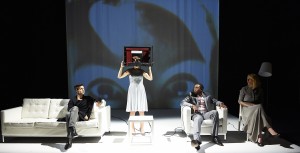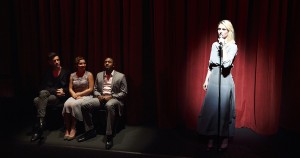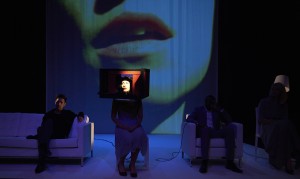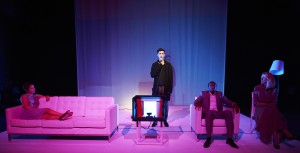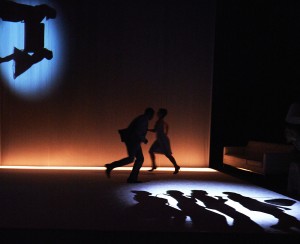THE UNKNOWABLE WORLD THAT WE LIVE IN
Is it possible for true love to be unrequited? Or, to put it another way, is it possible for unrequited love to be true? These questions, on the surface as deceptively simple as Ivan Viripaev’s story-telling framework, are at the core of his play Illusions, which uses the queries as a jumping-off point to explore fascinating, complex themes dealing with love, as well as the uncertainty in, and of, existence. Deftly translated from the Russian by its director Cazimir Liske, this presentation at the Baryshnikov Arts Center is a masterpiece, simple in form, profound in content, and exciting in style. Watching this riveting, funny, and ultimately tragic show, one immediately feels safe in the mature hands of its creators; never do I fear that they will lose me by doing something cheap or banal or agenda-driven, which is important when communing with a work of art that progresses in time, a communion that in this case ultimately leads to catharsis.
Mr. Viripaev’s creation isn’t exactly a play in the conventional sense. The performance consists fundamentally of four actors’”two men and two women in their thirties (Anthony Gaskins, Stephanie Hayes, Annie Purcell, and Mickey Solis)’”taking turns telling stories about two couples, Sandra and Denny, and Albert and Margaret; both couples have been married for over 50 years, and have been friends for even longer than that.
With the house lights up, Ms. Hayes tells the first story into a microphone at the foot of the stage in front of a crimson curtain, the other three performers sitting off to her right on ordinary plastic and metal school chairs. It begins when the couples are in their 80s, with Sandra sitting by Denny on his deathbed. He uses his last minutes of life to tell his wife, in gorgeous but unaffected speech, how much he loves her and has loved her every day that he’s known her. He tells her how grateful he is to her for her love and for teaching him what love is. “Nothing is capable of recovering us from the abyss of egocentricity except love,” he says, declaring that love is the acceptance of responsibility, and that the most important things in life are to be responsible (for someone else) and to be thankful, which he is, for her and to her.
“You said,” continues Denny, “that true love can only be mutual love….and if (only) one person loves there is no love to begin with….that means that I am responsible for your love….When I was on the verge of cheating on you I suddenly remembered your words….that love is reciprocity, and then I understood that my actions would betray not only my love, but yours as well. I made a conscious effort and avoided being unfaithful.” Then Denny dies and what follows are more stories from the two couples’ lives, stories which serve to undermine the foundation of not only their hopeful assumptions about their realities, but of ours.
Mr. Viripaev’s script gives a director virtually unlimited freedom, and Mr. Liske takes full advantage, using inspired theatrical language to make us not only feel the emotion behind the stories, but also to experience viscerally its metaphysical aspects. In doing so Mr. Liske creates art. And it’s fun: At one point we see Mr. Solis, as he’s telling a story, walk behind a white curtain. We see his shadow walking behind the curtain, and it’s still walking behind it when he emerges from the other side. Many of these sorts of whimsical yet poignant touches, as well as Vladimir Gusev’s fantastic video projections, deepen our experience of not only the world on the stage but of our own world as well. Illuminated by Thomas Dunn’s transportive lighting design, Arnuflo Maldonado’s set’”white, simple and modern’”has a subtle sense of unreality to it, of a place that is in between worlds. And Gocha Tsinadze’s music contributes additional depth and a subtle roundness to the proceedings.
photos by Anna Lee Campbell
Illusions
Jerome Robbins Theater
Baryshnikov Arts Center, 450 West 37th Street
scheduled to end on September 24, 2014
for tickets, call (646) 731-3200 or www.bacnyc.org

